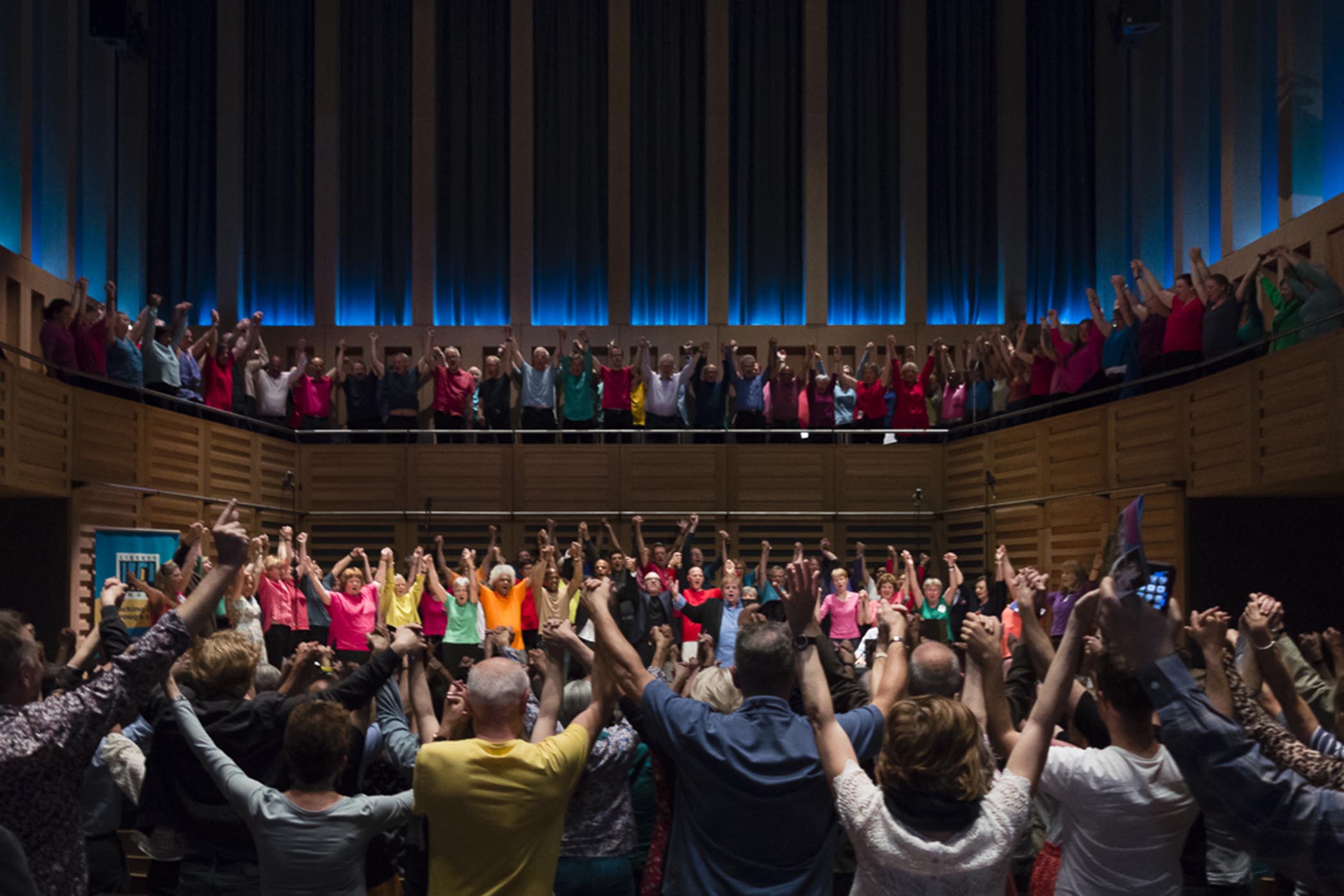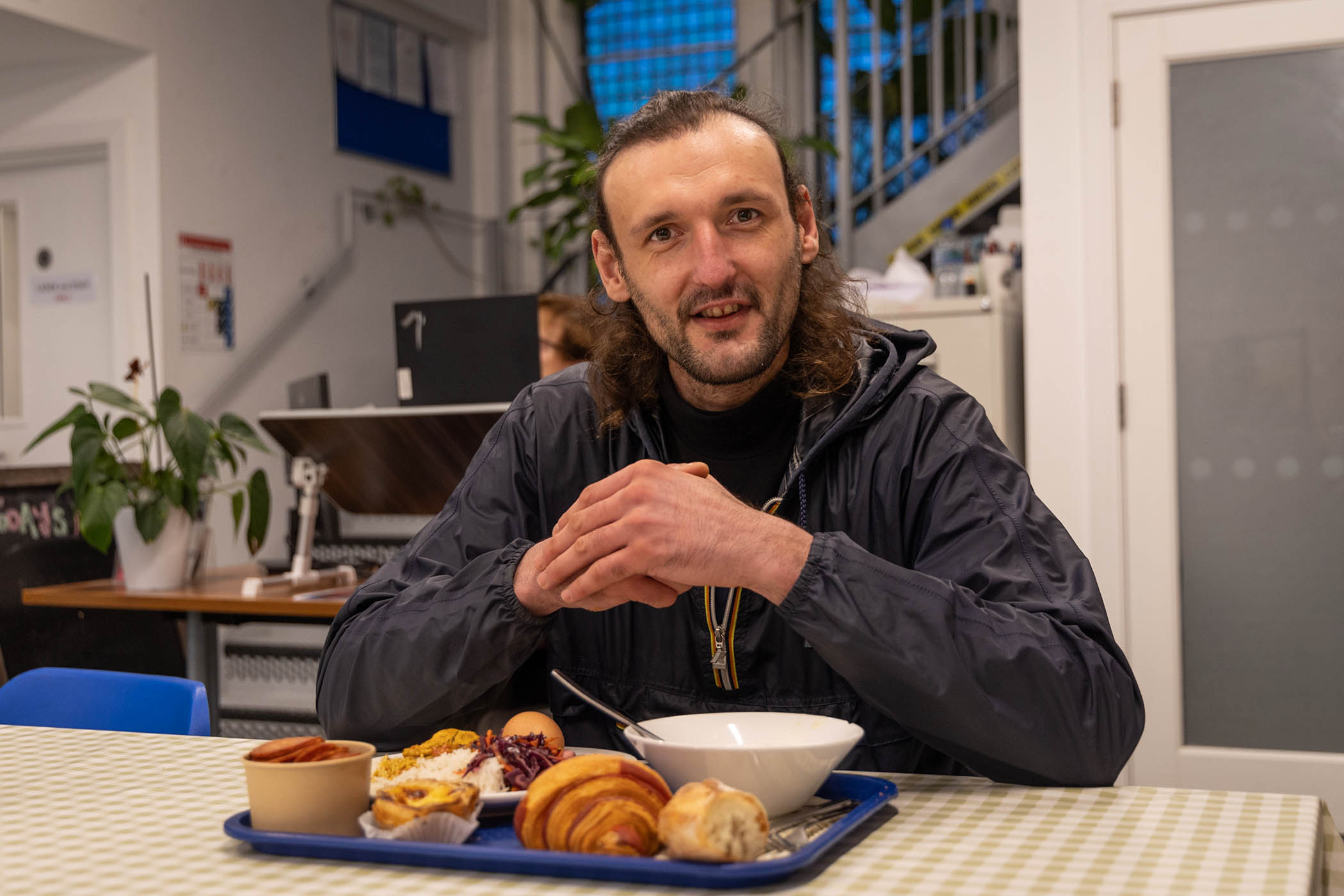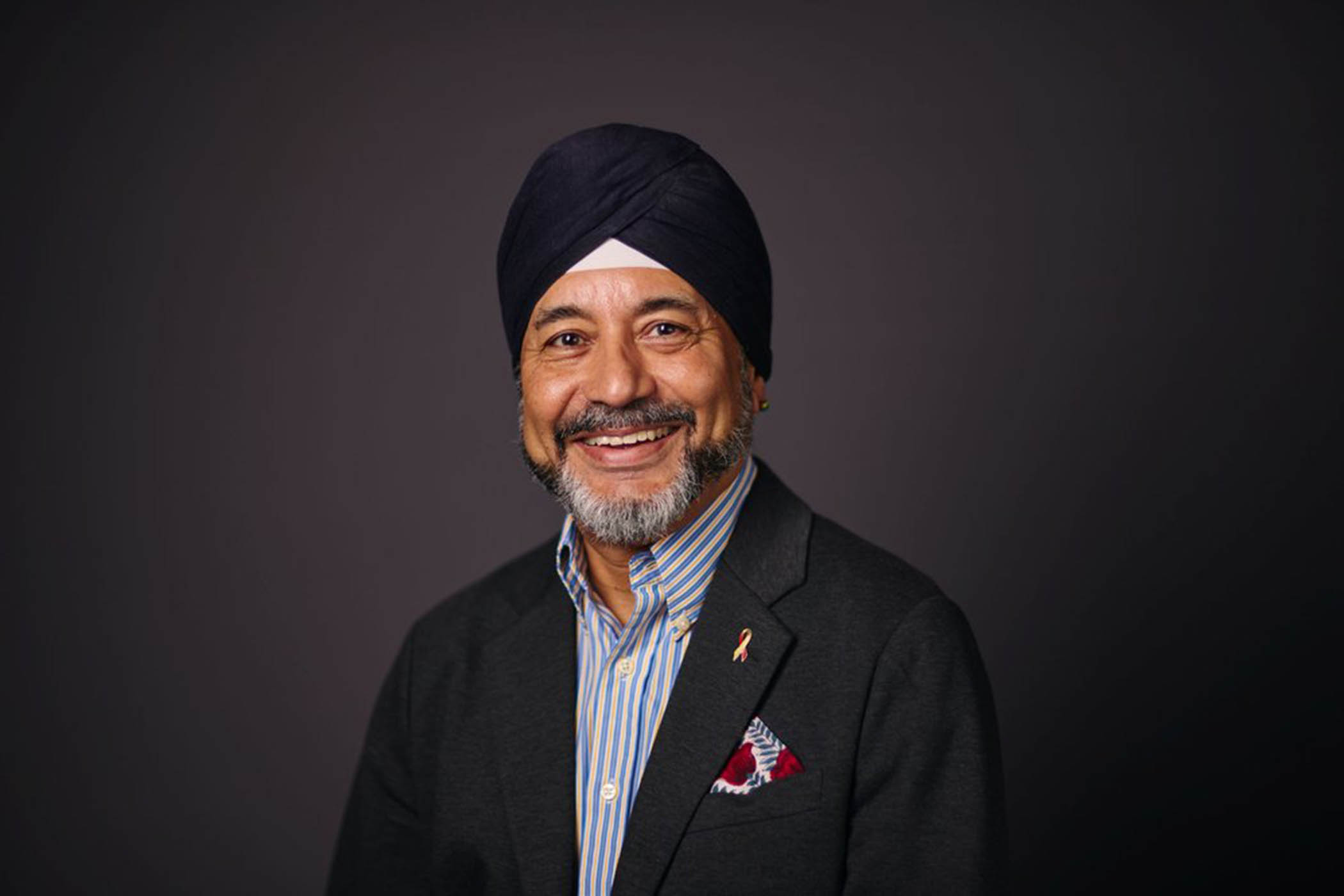Hans – all names and nationalities have been changed – is distressed, angry, and itching badly. He scratches violently, up and down his bleeding legs, then rubs his head, repeatedly before examining his fingernails. He says he has a terminal illness and fears he will not leave prison alive. Then he starts singing a song in his own language that meanders, rising and falling erratically. It calms him and wins praise from his fellow choir members. He sits back in his chair and smiles, his first moment of calm.
Linley is powerful, smart, funny and a fine and enthusiastic singer. He has celebrity qualities, but what he describes as a trifling incident while he was on license from his prison term cost him his freedom and opportunities. He admits that after a long string of convictions he deserves his sentence, but swears he has turned a corner, and pledges to join his new friends in Liberty Choir when they gather regularly to sing together on the outside, a key part of the charity’s mission. He warmly hugs everyone in the room and makes a short speech effusively thanking them for coming every week, before heading back to his cell. Bernado is stricken with shock, slumped in his chair, unable to communicate with anyone because he is Brazilian and speaks only Portuguese, and because he is bewildered and unable to comprehend what has happened to him since his arrest. Another prisoner, a Libyan who remarkably speaks Portuguese along with four other languages, gently embraces the distraught man and coaxes him into the group of prisoners and volunteer singers, of which I am one.
They are among the thousands of prisoners from jails across London and the south-east who have joined Liberty Choir groups since the charity was formed in 2014 by two remarkable and driven women,the acclaimed journalist Ginny Dougary and the American musical director MJ Paranzino. This week, as Liberty Choir negotiated to take its volunteers into new prisons in the south-west, it was recognised for its achievements, winning the prestigious Longford Prize, which celebrates organisations working in prison reform.
I join my fellow volunteer singers under the bleak walls of our jail at 8.45am, waiting for stragglers to make their way through the London rush hour to join our weekly bid to bring music and companionship to the men locked inside. Some have travelled miles to be here. Among our dozen or so members are a teacher, a nurse, a lawyer – volunteers are drawn from a wide variety of backgrounds,united by a belief in the power of music to humanise a shunned and often brutalised community. Most have fine voices, with many singing in other community choirs. I am tolerated for my enthusiasm. Like many, I recently retired – until last year I was editor of The Observer. For decades I have travelled past one of the capital’s jails on my way to work, and like millions of Londoners have wondered what life must be like for the prisoners packed into the cells of the dilapidated Victorian building, a fixed landmark in a changing skyscape, and a permanent reminder of a cruel and dysfunctional penal system forever teetering on the brink of crisis.
The Longford Prize has particular resonance for me. The Observer has a proud tradition of campaigning for prison reform, and Lord Longford was a close collaborator of my predecessor, David Astor. After editing a paper committed to uncovering and challenging the scandal of Britain’s prison system, here is my chance to make a difference from closer to the scene of the criminals.
We are ushered inside by one of the two professional musicians in the choir. One is a formidable opera singer who can be heard across the wings when she chooses fully to unleash her gorgeous, soaring voice. The other is an accomplished jazz pianist who can turn his hand to everything thrown at him, from reggae to Broadway musicals, soul standards to ballads (the choir is not religious, though one of the choir’s favourites is the gospel classic River in Judea). Inside the tiny reception area w e hand over our possessions and inch through the security system, where we are fingerprinted, scanned and frisked, and sometimes sniffed by dogs.Our names are checked against registers pinned to clipboards while our choir leader patiently explains once again who we are. “Liberty Choir… No, Liberty Choir. Yes, of course you remember, we spoke last week. We speak every week. Here we are again.” And inside we go, to collect the bunches of keys we are trained to use to let us into the heart of this benighted place.
Hans is distressed, angry. But then he sings. He smiles. A first moment of calm
Hans is distressed, angry. But then he sings. He smiles. A first moment of calm
The inside of an old prison is an assault on the senses. There is a powerful smell – of stale bodies, cooking food, drains, damp, a faint trace of cannabis. There are noises that quickly become familiar – clunking locks and slamming iron doors, shouting, sometimes desperate screaming, occasionally violent banging on doors. The huge walls, recently painted on the outside, are bare and grim on the inside and festooned with barbed wire, occasionally interrupted by an explosion of colour from a mural painted by one of the prisoners. Everywhere are prisoners in their drab grey tracksuits, standing in shared corridor space, queuing at the medical counter, lying prone in tiny cells packed with mementos from home, tiny TV screens or cooking utensils, or in small lines following prison officers on the missions and routines of prison life. Some are hunched round card games, some sit and stare vacantly into space. From the centre of the hub, the wings disappear into the distance, tiers of tiny cells and rolls of netting stretched between the landings.
A withering recent report by the prisons inspectorate described conditions in one London prison: 44% of prisoners felt unsafe at the time of the inspection, with the ingress of drugs driving high levels of violence. Poor relationships between prisoners and staff were affecting the rest of the population; there was a noticeable lack of empathy and care. “Tragically, three prisoners had killed themselves at the jail this year alone,” inspectors said.
They described how the wings were dirty, noisy and chaotic, with a pervasive smell of drugs and infestations of vermin. Most prisoners spent more than 22 hours a day locked in poorly ventilated, overcrowded cells, with little chance of getting to the work or education they need to encourage their rehabilitation, they reported.
Prisoners who join our choir echo this account. One describes how the rats have learned to wait for the last inspection at night before squeezing under cell doors in search of food stored inside. Others relate how cockroaches are endemic in the building’s pipework. They tell of being locked in cells with men they distrust or fear. Of excrement being thrown through cell door windows. Of unexplained and endless lockdowns. Of violence between rival gang members. Of the drugs, phones and other banned goods that flood through security into the building, or are dropped over walls by drones, and change hands for huge prices.
Newsletters
Choose the newsletters you want to receive
View more
For information about how The Observer protects your data, read our Privacy Policy
Into this toxic mess Liberty Choir brings some relief and humanity, inspired by a belief that singing together can encourage empathy and co-operation, build relationships that might thrive outside prison, and remind ourselves that humans are social beings and part of wider collectives, whatever their individual flaws. Sometimes there is a tiny number of prisoners in the room – chaotic lives, commitments to other activities, staff inertia, a rapidly changing population mean routines are hard to establish. Then, volunteers will spread out and visit them on the wings, negotiating the bureaucracy of the system and the apathy that can settle over the prisoners.
Prison officers can be helpful, kind to prisoners and welcoming to us. The governor is supportive, eager to challenge the baleful legacy of overcrowding and shrinking resources he has inherited from years of political neglect. Within parts of the prison system there are serious efforts under way to encourage reform, for instance shifting towards a more rehabilitative approach exemplified by the so-called “Nordic” model. But in our jail, other some staff can be indifferent or suspicious of our efforts, making the job of gathering inmates from the cells each week frustrating. For the volunteers this is dispiriting, but never enough for them to break their pledge to turn up each week and offer their companionship to prisoners able to join.
And the sight of a circle of tough and sometimes brutalised prisoners joined with a dedicated group of volunteers tackling the harmonies in a Ghanaian call-and-response chant, shuffling around to the rhythm of Dean Martin’s Sway or visibly moved by the lyrics of Snow Patrol’s Run makes it seem worthwhile. It feels like a safe space in the chronically overcrowded,chaotic and often frightening places that make up much of our prison estate, mostly hidden from our gaze by towering walls and public indifference.
Join the Liberty Choir programme, support it with donations, or find out more at libertychoir.org
Photograph by Ben Mueller-Brown


